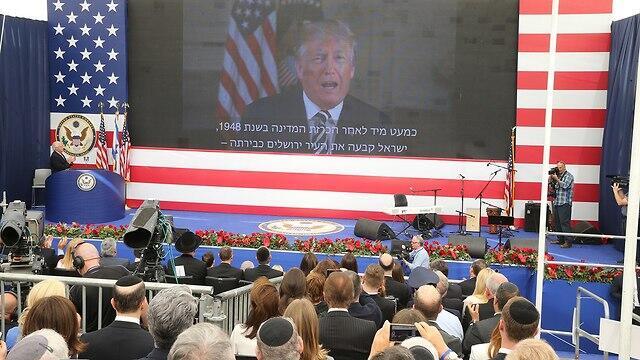Getting your Trinity Audio player ready...
US Jews are in a critical crossroads these days in terms of their identity, their location in the American society and their attitude towards Israel.
Liberal Jews have been experiencing a community and identity erosion for a long time now, and their difficulties with tribal and religious Israel are only aggravating their internal American problems. On the other hand, Orthodox religious Jews—and even Haredi Jews—are strengthening their affiliation with Israel and moving away from liberal Judaism.
The American Jewish Committee (AJC), which convened in Jerusalem for its global forum earlier this month, must deal with these two issues: The US Jewry and Israel’s position among this Jewry.
2 View gallery


The AJC’s greatest challenge is to defend Israel, while many of its supporters among America’s Jews are keeping away from Jerusalem ideologically
(צילום: AFP)
For years, the AJC has been the leading organization in issues of Judaism in international relations. It helped Jews from Eastern Europe arrive in the US even before World War I, and it later took part in the struggle to open the gates of the USSR. The organization also fought against anti-Semitism in the Catholic Church, helped build bridges of interfaith reconciliation and played an important role in maintaining the Jewish heritage and imparting the memory of the Holocaust in post-Communist European countries.
Although the organization was hostile to Zionism at first and saw the US as the ultimate solution for Jews—the “promised land” of the free Jew—after the State of Israel’s establishment, and especially after the 1967 Six-Day War, the AJC gradually became Zionist. Today, when Jewish international issues are almost always related to Israel, the AJC serves as the state’s mouthpiece in many places in the world, and the organization’s leader, David Harris, is perhaps the most important Jewish “diplomat” in the Diaspora.
The organization’s greatest challenge is to defend Israel, while many of its supporters among America’s Jews are keeping away from Jerusalem ideologically—on matters of freedom, religion and the Palestinian issue. They carry a heritage of liberal democracy and seek to export to the world values of freedom and human rights. But when most of them feel Israel is becoming increasingly indifferent about these issues, the ideological gaps are emphasized. Most US Jews are also hostile towards President Donald Trump, while Israelis see him as a real national hero.
2 View gallery


US Embassy opening in Jerusalem. US Jews must be convinced that being affiliated with Israel is appropriate on the moral level and on the level of the future Jewish interest
(צילום: עמית שאבי)
Speaking about Trump, in the past year and a half the committee has been treading lightly when it comes to the American president: On the one hand, it is demanding that he fight the growing anti-Semitism in the US uncompromisingly; on the other hand, it supports him on Jerusalem although many liberal Jews aren’t thrilled about his decision to move the embassy there .
The organization is trying to explain to the world that Israel’s commitment to a free democracy, as well as to the “two-state” vision, is deep, and that Palestinian rejectionism and the Islamist threat are preventing progress towards a solution to the conflict. But in light of the Israeli Right’s perception that Israeli sovereignty should be expanded to all Judea and Samaria territories, and in light of the religionization issues in the state (the conversion bill, the Western Wall plan), the AJC’s work is becoming more complicated.
Israel isn’t as dependent as it used to be on the US Jewry, but it needs the AJC, as well as liberal Jews in the US, when dealing with issues of legitimacy and building diplomatic bridges. It must therefore make sure that the differences between the AJC’s mission, which is helping Israel all over the world, and the internal—national and religious—trends won’t wear out this important support.
Harris and his friends realize that Israel is critical for the Jewish existence in the Diaspora and for maintaining their Jewish identity. Their job is to convince US Jews that being affiliated with Israel is appropriate on the moral level and on the level of the future Jewish interest.
The findings of a public opinion poll conducted ahead of the organization’s annual conference indicate that US Jews are drifting away from Israel. AJC officials understand that the damage caused by drifting away has to do with the Jewish identity around the world: In an era in which Israel is the main resource of Jewish identity in the world, world Jewry can’t afford to distance itself from the state, as that would harm its own identity. The great challenge faced by Harris and his friends is whether their diplomatic skills will be enough to bridge the gaps.
Yossi Shain is the Romulo Betancourt Professor of Political Science at Tel Aviv University where he also serves as the head of the Aba Eben Program of Diplomacy and co-chair of the MA Program in Political Leadership

